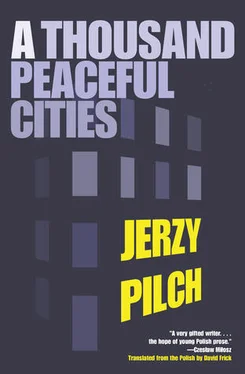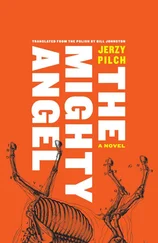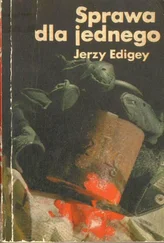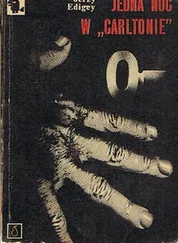“St. John of Damascus divides anger into gall, mania, and fury, and you, Comrade Trąba, you are most clearly in the phase of fury,” said Commandant Jeremiah, leaning backwards as if to avoid immediate danger.
“I didn’t know they covered St. John of Damascus’s typology of anger in Marxism night-school. I approve. I approve, and I congratulate you. I, however — and now I will allow myself a polemical interpolation ad vocem —I am not in the phase of fury according to St. John of Damascus; rather, I am in the phase of anger with voice, according to St. Gregory of Nyssa. St. Gregory of Nyssa, as you know perfectly well, divides anger into anger without voice, anger with voice, and anger expressed in voice. One way or another I am — I often find myself — in the pre-delirious phase. Vodka-induced psychosis is already knocking with a finger that’s as transparent as a vodka glass; it’s already knocking on the brittle walls of my brain.”
Mother placed the first portions of potato dough on the stove top. The fire roaring below and the streams of darkness beyond the window transported us beyond climates and beyond seasons. We sat in the circle of light, separated from what was further on, and further on were ice and darkness. The Commandant’s uniform steamed slowly. Jeremiah dried and glimmered, like a prodigal deserter returning to the ranks of his home unit.
“And what would you think,” he said slowly, “what would you think about stopping and giving it up?. . About reducing the volumetric reckoning a little. You’ve already drunk your life’s quota.”
“Stop drinking?” Mr. Trąba neither quite asked, nor quite asserted, his voice colorless as water. “Stop drinking? Out of the question. Already in ’45 I said to myself: ‘Perhaps you will die of vodka, Józef Trąba, but if you don’t have a drink from time to time, you will certainly die.’ But now, after not quite twenty years, that paradoxical supposition has taken on a completed form. You know, Commandant,” Mr. Trąba came to life, clearly gathering narrational verve, “a man has only one good reason to stop drinking: namely, when he notices that as a result of drinking he is going stupid. Let me put it another way. A true man can die from drinking, but he doesn’t dare go stupid.”
“In that case,” the Commandant spoke most carefully, “in that case, why do you put your lofty mind at risk, Comrade Trąba?”
“You insult me, Commandant,” said Mr. Trąba with dignity. “Just why should a man live in stupidity?”
“And carrying Gomułka off with you, carrying Gomułka off with you to the grave,” Jeremiah suddenly got angry, “and carrying First Secretary Gomułka off with you to the grave — this isn’t stupidity? This is colossal stupidity! Stupidity that is pointless and historically barren. Stupidity that leads nowhere and is intellectually empty.”
“Terror is not the realm of speculation; terror is the realm of shock,” Mr. Trąba said gloomily.
“What terror? What terror? What terror?” the Commandant roared with the greatest contempt.
“Maybe our terror is not a great terror,” Mr. Trąba flared up, “but it’s still terror. Better that than nothing. Better a sparrow in the hand than Mao Tse-tung on the roof. Yes, OK, I intended to do something for humanity, but after all, if I do something for Poland, I will have done it for humanity too. Of course I would prefer a great deed on a global scale. Of course I would prefer, as I explained to you,” Mr. Trąba raised his shoulders, “of course I would prefer to tighten my tyrannicidal fingers around the neck of Mao Tse-tung. A person would get to see a little of China in the process. But we don’t have the resources for such a long journey,” Mr. Trąba sighed regretfully, “and a short trip is out of the question for reasons of ambition. You can’t expect me to humiliate myself with quasi-foreign trips around the block of the People’s Democracies. Oh no, not that, no. I certainly won’t go to Sofia to lie in ambush for Comrade Zhivkov. Nor to East Germany in order to administer justice to Walter Ulbricht. Please don’t even try to persuade me.”
“And what about Khrushchev?” Mother unexpectedly spoke up, neither asking nor quite proposing, from above an already considerable stack of potato pancakes. “Have you considered Khrushchev?”
“Khrushchev,” Mr. Trąba seemed to ignore the absolute astonishment with which Father and Commandant Jeremiah looked at Mother, “Khrushchev may be removed at any moment. It isn’t worth the effort. I go to Moscow, which, however you look at it, is also a good hike, and on the spot I discover that changes have just then taken place at the highest level of the CC CPSU, and I’ll look like a boob.”
“And if, Comrade Trąba,” Comrade Jeremiah’s voice suddenly became warmer, “and if. . of course these are absolutely not our methods,” he suddenly stipulated in a panic, “and if, and if it could be, we could even, not so much help, that’s too strong a word, but, let’s say, we could not know about certain things, uh, even a passport, any time — and if it could be the Bloody Dictator of Fascist Spain?”
“Caudillo Bahamonde Franco is one of Europe’s greatest statesmen,” Mr. Trąba said with distinct pity. “I remind you: I wish to do something for humanity, not against it.”
It might have seemed that it was not steam that was departing from the Commandant’s drying uniform, rather it was the furies departing from the man himself.
“Never. We will never,” he panted heavily, “we will never come to terms, Comrade Trąba. Be my guest — kill, kill whomever you wish. Yes,” the Commandant suddenly seemed to discern a deeper meaning in what he was saying, “yes, kill whomever you wish. Kill anybody at all. After all, that too will bring the decline of your life into order. Go out into the street, kill whomever, and you’ll see in just what implacably logical scheme of events you’ll find yourself. You won’t do much for humanity, but you will do something for yourself . And after all, if you do something for yourself, it’s as if you’d also done something for humanity. Don’t you agree?”
“What do you do for yourself by killing just anyone?” Father asked in a strangely high voice.
“One’s life becomes definitively ordered, especially the disorderly life, and your life, comrade,” the Commandant stretched out his hand to Mr. Trąba in what was almost a welcoming gesture, “is an unusually disorderly life. A person kills, becomes a murderer, and by being a murderer he disperses doubts and does away with choices. Being a murderer is the guarantee of a highly stable identity. First, if you should decide to go into hiding, comrade, you’d be a murderer in hiding. Then, if they should arrest you, you’d be an arrested murderer, then a judged one, then a condemned one, and then,” the Commandant suddenly stopped, as if he had realized that he was about to say something tactless. He finished in a more peaceful voice, although it still vibrated with rage: “Let’s save our breath. Be my guest. Go ahead and kill, comrade, kill whomever you like.”
“This is painful, painful to listen to,” Mr. Trąba said with a sadness that tore your heart to pieces. “Please, Mr. Commandant, don’t make me into the posthumous child of existentialism’s precursors. I wouldn’t even consider killing just anyone. I haven’t the least intention of joining that godless philosophical current. I intend to join the murky circle of the great tyrannicides of human history: Peter Pahlen, Gavrilo Princip, François Ravaillac, Jeronimo Caserio, Józef Trąba. . Not a bad list of names,” he said, falling into dreaminess, but he immediately roused himself again.
Читать дальше












